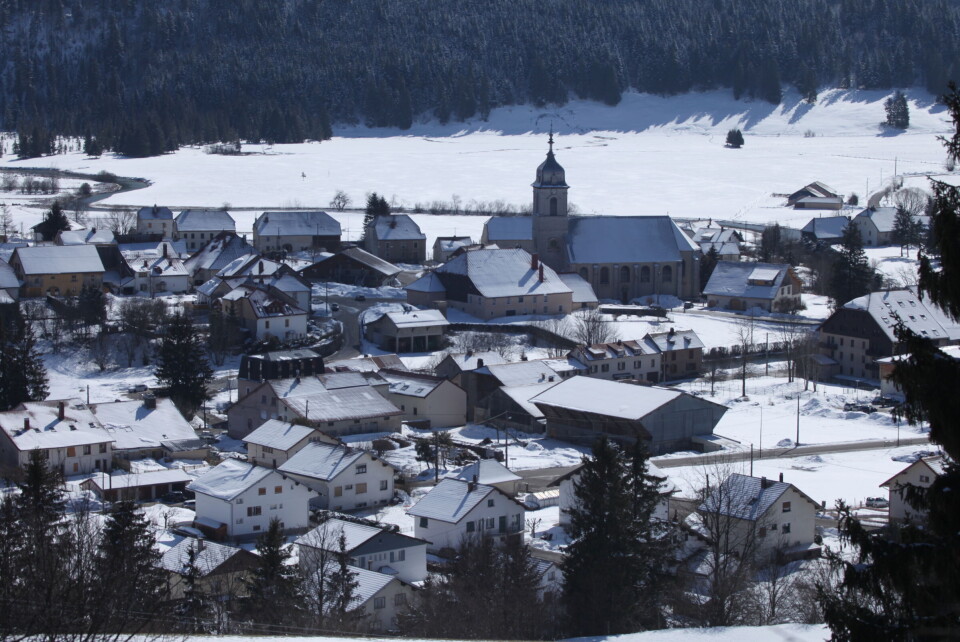-
The origins and meaning of tirer les marrons du feu
As Christmas approaches, we look at a phrase to describe someone who takes advantage of a situation
-
Hérault red flood alert after 300mm of rain hits southern France
Several roads and public areas closed in Montpellier due to flooding
-
French weather forecast for Christmas week: where will there be snow?
Temperatures will drop to nearly 5C colder than seasonal averages
Can Mouthe claim to be the coldest place in France?
Discover the temperature-driven rivalries between Mouthe and neighbouring villages in this frostbitten part of Doubs, France, where wolves threaten farmers’ livelihoods

You had better pack a polar jacket if you plan to visit Mouthe (Doubs), a village of 1,108 inhabitants on the Swiss border.
Welcome to “The little Siberia of France”, where the nation’s coldest temperature was recorded on 17 January, 1985, with a lip-freezing minus 41 degrees Celsius.
In Mouthe, the ground freezes on average every two days (176 days per year) and the thermometer dips below minus 5 for around 80 days.
The temperature drops to minus 20 six times every seven years, minus 25 every two years and descends below minus 30 every eight years, according to reports from Météo France.
So much so that inhabitants have made snow and blazing winds an art de vivre and the mairie has generated a lot of tourism from its frozen lands, even if its record is disputed.
Daniel Perrin, Mouthe’s mayor since 2014, told The Connexion he had a discussion last year with representatives of Mignovillard, a nearby village, who said that one person in its hamlet, La Combe Noire, had recorded an even lower temperature.
“It cannot be recorded since no one lives there,” said Mr Perrin, adding that he thinks that several valleys surrounding Mouthe may have recorded similar temperatures.
Meteorologists put Mouthe’s exceptional cold down to a combination of altitude, absence of trees and vegetation, the presence of snow, and the flattened basin shape of the land.
‘Inverted-temperature’
All of which creates an ‘inverted-temperature’, a phenomenon where ground air is colder than the atmosphere since it does not receive enough solar radiation at night.
La Combe du lac in Lamoura (Jura) or La combe des Cives in Chapelle-des-Bois (Doubs) have similar winters, leading to rivalries over which village is the title-holder of France’s coldest.
They have both observed colder temperatures than Mouthe, although never reaching Mouthe’s rock-bottom record.
Meteorologists believe La combe des Cives or other surrounding areas could have been colder on that particular January night.
But Mouthe’s thermometer was the only one functioning, and it was not situated in the coldest areas of the region.
But Mouthe has another less known characteristic feature.
The village is the source from which the Doubs, France’s tenth biggest river, and an affluent of the Rhône, springs from a 55-metre-long syphon at 940 metres high.
It was named by Julius Caesar after he decided it was “indecisive”.
The source is the Doubs department’s busiest site, where Mr Perrin has installed ten ski chalets, particularly aimed at cross-country skiers, since Mouthe is at the end of the famous Transjurassienne cross-country skiing competition.
The shimmering frost on the nearby forests clothe the village of Mouthe in a lily-white blanket during the winter season.
Packs of wolves
The forests also hide packs of wolves that are suspected to have killed nine cows in September 2022, killings that have put pressure on the Doubs prefecture to act.
Farmers have asked the prefecture to allow tir de prélèvement, a phrase which describes an event organised by hunters who possess a licence to kill wolves, which is the highest level of the government’s regulating plan for wolves.
Tir de prélèvement was allowed for the first time on 26 September, 2022, in the Lorèze department. Associations have opposed the solution, arguing that it is useless and does not regulate the activity.
Related articles
‘Coldest town in France’ sees first-ever October with no sub-zero days
Mild winter in France wreaks havoc on fruit producers and in gardens
How will weather be in my French town in 2050? New tool helps find out
























